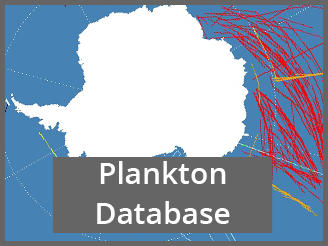 The Southern Ocean Continuous Plankton Recorder Database was initially established to assist the development and expansion of the CPR research in the Southern Ocean and Antarctic waters, but now focuses on the Quality Assurance and Quality Control (QA/QC) of the data and maintaining the highest methodological standards in CPR sampling and taxonomic methodology across the SO-CPR Survey laboratories.
The Southern Ocean Continuous Plankton Recorder Database was initially established to assist the development and expansion of the CPR research in the Southern Ocean and Antarctic waters, but now focuses on the Quality Assurance and Quality Control (QA/QC) of the data and maintaining the highest methodological standards in CPR sampling and taxonomic methodology across the SO-CPR Survey laboratories.
The SCAR Southern Ocean Continuous Plankton Recorder (SO-CPR) Survey was established in 1991 by the Australian Antarctic Division to map the spatial-temporal patterns of plankton biodiversity and use the sensitivity of plankton to environmental change as early warning indicators of the health of the Southern Ocean. It also contributes to or can serve as a reference for other observational/monitoring programmes such as the Southern Ocean Observing System (SOOS), Southern Ocean Sentinel (SOS), CCAMLR Ecosystem Monitoring Program (C-EMP), and the Integrating Climate and Ecosystem Dynamics (ICED) program.
Antarctic plankton are expected to be particularly sensitive and vulnerable to climate change, both because of changes in ocean temperatures and by changing sea ice patterns. Increased UV levels, ocean acidification, invasive plankton species, pollution and harvesting impacts are also potential major threats. The synergistic effect of these threats working in combination is currently not known. Any change in the plankton are expected to have cascading effects through the rest of the food chain, as well as potentially altering the role of the plankton in the global climate system.
At the 2016 SCAR Delegates Meeting it was approved that the EG-CPR transitions to the SO-CPR Database Expert Group (SO-CPR), to focus on its new aims (detailed above).
See also the SO-CPR data website.
